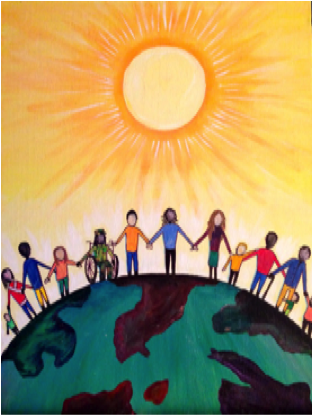Healing After Disasters
Disasters impact survivors emotionally, physically and spiritually. Understanding common reactions to extraordinary events can help us devise strategies to reduce survivors' emotional, physical, and spiritual reactions.
Key Points
Survivor's guilt can be an overwhelming response after emerging relatively unscathed when others did not.
Strong emotions and guilt are natural response to an extraordinary event.
Acts of generosity activate brain circuits that support well-being, whether witnessed, given, or received.
Disasters have plagued communities worldwide. The widespread destruction from the recent Southern California wildfires has been unfathomable as the trail of destruction is witnessed first-hand by residents of Los Angeles County and by others through social media and television. As an Angeleno, there is a palpable "disturbance in the force," to use the expression from Star Wars, impacting residents emotionally, physically, and spiritually.
Some survived the fires relatively unscathed, while others lost homes, possessions, or beloved friends, family, or pets. There is a prevalent thought that life will never be the same. Survivors of other disasters have described similar reactions.
Photo by Elaine Miller-Karas
Understanding Survivor’s Guilt
Survivor's guilt is complex and can be an overwhelming response characterized by feelings of sadness and anxiety for having survived a disaster relatively unscathed while others did not. Some people report reactions that include insomnia, physical pain, and a heightened sense of physiological responses, including rapid heart rate and breathing.
It can be a common reaction to replay events, questioning decisions or circumstances that led to their safety. "Why did my house survive?" or "What could I have done differently to help my neighbors' house?" are recurring thoughts that can intensify guilt. If a neighbor was injured or died, a survivor may also be plagued by questions such as "Why did I not check to see if they escaped before I left my house?" Some people may feel that they cannot share the true extent of their grief, believing that they would cause others more significant distress.
The Impact on Well-Being
Survivor's guilt can have profound effects on well-being, leading to additional reactions such as:
Hypervigilance: Constantly worrying about future disasters or the safety of others. For example, a survivor of the wildfires shared her fear that California would now have the big earthquake Angelenos have been warned about for decades, leading to greater devastation and loss.
Depression: Experiencing chronic sadness as the immensity of the losses becomes more apparent. This depression can be sparked by the realization that the life that had been is no more. Although others speak of hope and recovery, the depressed person may have a persistent thought of worthlessness partially because of the loss of all that was familiar and predictable.
Post-Traumatic Stress: Reliving the traumatic event through flashbacks or nightmares can lead to chronic mental health conditions like Post-Traumatic Stress Disorder.
Social Isolation: When neighborhoods are destroyed, so are social networks that once provided support. A survivor may not know where to turn to for support, which can result in feelings of loneliness.
These symptoms can disrupt daily life and hinder the healing process, making it essential to address survivor's guilt proactively.
Steps Toward Healing
If you or someone you know is experiencing survivor's guilt or other strong emotions after a disaster, it's essential to recognize that these feelings are a natural response to an extraordinary event. Here are some steps that may help:
1. Acknowledge Your Feelings. Allow yourself to feel the emotions without judgment. Writing in a journal or sharing with a trusted friend or counselor can be helpful. Embrace and notice your tears. Many organizations provide drop-in support gatherings where people can share their feelings and frustrations in person and through virtual platforms.
2. Seek Professional Support. Therapists trained in trauma and resilience can help survivors process their experiences.
3. Engage in Community Support. Volunteering to help others affected by the fires can transform feelings of helplessness into meaningful action. Being part of a supportive community fosters connection and collective healing. As the rebuilding process begins, it can also give meaning and purpose to one's life.
CLICK HERE to read the full article on Psychology Today.
References
1 Davidson, Richard (2016)The Four Keys to Well-Being, Greater Good Magazine,3.21.2016. grateful.org/resource/richard-davidson-the-four-constituents-of-well-being/

